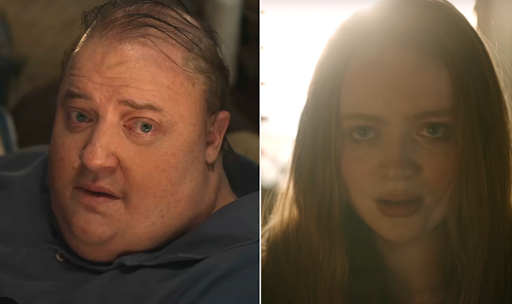The Whale

The chemistry between Charlie (Brenden Fraser), and his daughter, Ellie (Sadie Sink) is unmatched.
“In the amazing book Moby Dick by the author Herman Melville, the author recounts his story of being at sea…”
As a theatre person, I have read a multitude of plays, and quite honestly, there is a reason why most of them are coated with varying levels of dust, taking up space in the drama section of the library. However, every once and a while, you stumble upon plays which exude brilliance. Few are these hidden masterpieces, waiting patiently for recognition, but when you find them, it makes sifting through the dry excuse of plays worth it.
About a year ago, I came across a play entitled, The Whale, by Samuel D. Hunter. There was something about the painful reality of the dialogue that told me this work had the power to touch the hearts of many. Little did I know that someone else, Darren Aronofsky, had already had the same thought and was in the process of transposing the story for film.
“ In the first part of his book, the author, calling himself Ishmael, is in a small sea-side town and he is sharing a bed with a man named Queequeg…”
The story revolves around a man named Charlie who suffers from depression which has led him to be clinically obese. The story follows him come to terms with his past, sexuality, estranged relationship with his daughter, and God.
“ His entire life is set around trying to kill a certain whale. I think this is sad because this whale doesn’t have any emotions and doesn’t know how bad Ahab wants to kill him”
The first aspect of this movie that puts it over the top for me is the level of dedication both Brenden Fraser and the prosthetics artist put into truly experiencing and portraying obesity. A movie with such deep topics could easily be marred if the audience feels any inauthenticity or forced performance. However, you can tell how much thought everyone put into the character work for Charlie down to the very sound of his breath.
“He’s just a poor big animal.”
The intimate trust formed by this small cast may be unique for film sets but was a necessity for the authenticity of the movie. The size of the cast also allows for deep character development. No one remains static in this film which adds to its level of realism. Each character has their share of secrets and triggers which are slowly revealed throughout. Although I could spend all day raving about every single one of these actors, the chemistry between Charlie (Brenden Fraser), and his daughter, Ellie (Sadie Sink) is unmatched.
“And I feel bad for Ahab as well, because he thinks that his life will be better if he can kill this whale, but in reality it won’t help him at all.”
Upon first glance, Ellie could be classified as disrespectful or even sadistic. In fact, her own mother believes her to be evil. The few words she says to her father consist of deep cut insults. Her behavior does not stop at verbal abuse as shown when she forces her dad into walking towards her, something she knows he is physically incapable of. Underlying the actions though, the amount of hurt she feels radiates off of her. Every insult is rooted in emotional longing and pain regarding her father’s decision to choose his romantic partner over his family.
As the movie continues, it immerses the audience in more suffering from each person’s perspective, involving grotesquely accurate physical challenges of obesity, the impacts of losing someone to suicide — whether a family member or a romantic partner, and the uncertainty of religion, specifically the judgment of God. All the inner and outer turmoil is on full display, not covered by sugar coating or a Hollywood ending.
“…and I felt saddest of all when I read the boring chapters that were only descriptions of whales…”
Yet, the movie was not altogether sad. For in the midst of the despair, hope shone through. Through their suffering, love was overflowing.
“… because I knew that the author was just trying to save us from his own sad story, just for a little while.”
As the movie concludes, Ellie can be sure of one thing: her father will never stop walking towards her.
“This book made me think about my own life, and then it made me feel glad for my–”
And she has never— will never— stop loving him.
By Elizabeth Barrett ’23, Co-Creative Writing Editor
23ebarrett@montroseschool.org










